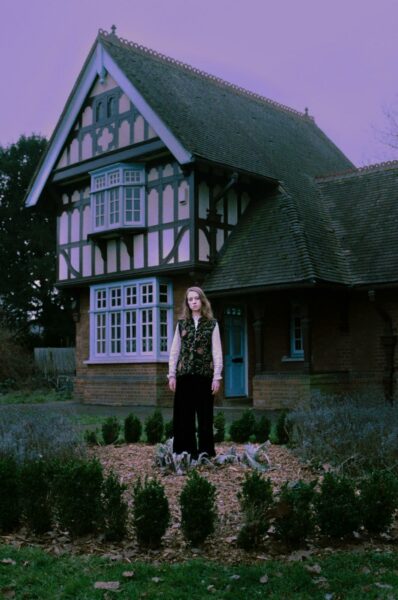It is a blessing to hear that a number of fascinating folk albums still can emerge in the private chambers of artists, such as in the case of Glaswegian singer-songwriter Neev, whose debut Katherine just got released the other week. “Feeling quite inspired at the moment” how everything turned out, she tells me that at the core of the record lay a period of an urge to write and compose, not being able to put it anywhere at the time:
“When 2020 hit and the pandemic hit, I just kind of had all of this like momentum and energy and nowhere to put it really other than my laptop and guitar and bedroom… it was just having that energy for writing, but kind of not really having anywhere to put it really. So that made and created a lot of songs… I basically started recording and producing everything from my bedroom.”
Adding to that, the songwriter appears to work in quite the classic fashion, with a guitar in hand and notebook in the other, as she reveals to me: “I have always from the first songs I’ve written to the songs I wrote a couple of weeks ago, written with a guitar in hand and writing. It has always been quite a fully formed thing for me”. However, there is far more to Katherine than just “a bunch of lockdown songs”, as Neev is going to elaborate in the next minutes of our interview. Part character study, part musical method acting to semi-fictional worlds and lives of her own vivid universe, the songwriter has created an alluring cosmos that is tied to the manifold notions of identity and how they shape the way we experience the world as well as how other people look at ourselves, gazing at the shapes and roles we assume every day.
The Eyes Of Others
All the songs on Katherine are very “self-indulgent“, Neev tries to wrap up her debut in a sympathetic fashion, describing that “none of the songs on the album are like completely grounded in reality”, but written “from someone’s perspective”. What looks like a pre-conceived conceptual record is actually the result of an intense writing period with the identity theme coming in fairly late in the process, the artist reflects. “All of the songs were written at a time of my writing style where I think I’m still there”, she ponders, and explains that she likes to “put my head or my brain in a certain space or scenario or identity and write very specifically from that”.
“Each song kind of dwells in its own identity and its own point of view, very self indulgently, I’d say. So I think one way of kind of putting it is that every song is just quite indulgent in its point of view, rather than, looking at it from any other perspective… I am trying to explore lots of different themes of what it is to be a woman, what it is to be a sibling, what it is to be, you know, in a relationship, loads of different dynamics. And I think, yeah, I think in the end, it was all of those songs had such a specific identity that that’s what felt like the theme.”
With the themes touching on identity facets as sprawling towards gender roles, family aspects and roles in society, touching on what it means to be a woman, sibling, father, mother, friend – just to name some notions Neev evokes throughout the songs, Katherine uses the song as a vehicle to develop intricate stories that are governed by the idea of multi-perspectivity and the attempt to empathize oneself with others, telling their stories, as if narrated through their own eyes.
“I think each song has a very strong point of view”, the songwriter remarks, as she goes into the separate pieces and reflects how the record stands for an attempt to understand the world around herself. The House for instance “very much touches on gender and the idea of being a woman that maybe had to sacrifice things in her life in order to pursue other parts of her life”. Drawing on the music video to illustrate her take on the character, she emphasizes that one realizes that “as soon as the husband or the other kind of exits, you realize this person has so much more to themselves, they have a creative identity”, adding that “to limit someone to a specific gender stereotype is not very accurate”.
“All the songs are strongly worded by one point of view and all of the songs kind of let an emotion identify the song.”
Fast Patterns meanwhile assumes the view of a “very self-absorbed friend and what can happen if you allow yourself and your own identity to get in the way of your friendship”, she sums up. Further describing how the country-inspired folk ballad tries to teach herself a lesson about friendship and how to avoid becoming a bad exhibit of such one, she remarks the essential subjective view: “Every single bit is about I think, and this is my opinion, and me is your friend.”
Dynamics Of Performance
If you think about the approach of Katherine, it does call to mind a theatrical notion in the regard of someone trying to assume the life of the mind of others. As it happens, theatre is of course no strange land for Neev, whose “entire family background… they all have a theatre background”, she admits and recounts her upbringing and how it impacted her own aesthetic education. “My granny”, she thinks back, “was an understudy by the end of her career. And I’ve spent so much time backstage with her while she was understudying”.
“Theatre has been a very integral part of my life… I’ve grown up with performance in my family and like going to the theatre from a very, very young age.”

Photo by Simon Dawson
To immerse oneself in the consciousness of others, while keeping one’s own subjective shape then could as well be the formula that adapts to Katherine. “I think the reason I leant towards these songs having such strong identities is because I can adopt those identities on stage”, Neev explains. “And I feel very attached to the emotions of those songs being communicated in a live setting. And I think what it allows is for a very dynamic performance as well”, she adds, emphasizing how the dynamics of performing the wide sonic range of songs on stage contribute to the theatrical dynamic. The live setting, she notes, “is very important to me. It allows that theatricality to come through”.
“At the end of the album I started really realising consciously what my process is and how much it is linked to theatre. And with new with new music that I’m writing now, I’ve been able to actually use that consciously, like I’ve read chapters of books now and I am able to write a song about this book chapter. And I’ve seen plays now and been able to use that really quickly and write about plays and about theatre characters. So it feels like tools now, and before it felt much more subconscious. And I feel like I can actually use these writing instincts and habits like more consciously, which I’m excited about.”
What’s In A Name?
For all the theatrical nature that lies in Katherine, there is an essential subjective and personal element that gives the multi-faceted play theme its idiosyncratic credibility, which gives the record its particular shine. It may just already start with her artist moniker Neev being the anglicised form of the same-sounding Irish name Niamh, her actual name in fact. Further doubling up the level of identity, Katherine is also her middle name, which draws back on her grandmother’s (who even painted the album cover).
“I just like the idea of giving the album a name, I like giving it an identity, like calling it something. To me, it gives the album the chance to be the album and like not inherently tied to me, because I’m such a massive advocate for like, when music’s out, it’s everyone else’s, your interpretation is so much more interesting than what I wrote it about, in my opinion. And to give it that name and sign it off, let it be other people’s.”
Consequently giving the multi-faceted characters in Katherine her own subjective layer, Neev rounds off the identity vortex of her debut by letting us in on her own world at last. And as every act of Katherine comes in the disguise of the artist peeking into strange lives and identities, they just as well give way to the perspectives being extrapolations of her own subjective reality, making Katherine the mult-layered work of art that it is in the end. And as that, it is an utter personal one telling us about the beautiful absurdity of being alive in this strange world.
“The name Katherine means so many different things to me. But it felt really natural to call the album that because it’s a name to me that means lots of things. And the album to me means lots of different identities and lots of different people.”
Neev’s Katherine is out now via Trapped Animal Records and available everywhere.
Want more of our regular folk recommendations? Follow our freshly updated For Folk’s Sake playlist right here.



